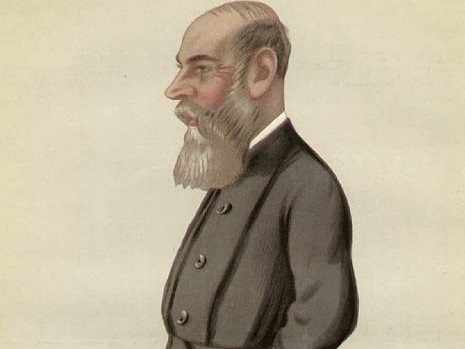Today in 1832, the birthday of a guy whose name has been used for well over a century anytime a group of people decided to deliberately take their business away from a group or a company: Charles Boycott.
The word boycott actually comes from a boycott against Charles Boycott, though the act of boycotting was going on long before the word showed up.
In the 1770s, some colonial Americans protested a tax cut on British tea by refusing to buy the tea, which eventually led to the Boston Tea Party.
And in the run-up to the Civil War, abolitionists refused to buy sugar that had been made with slave labor in the South.
Then along came Charles Cunningham Boycott.
He was an English land agent, whose job was to collect rent from the tenants of Lord Erne, the owner of some 40,000 acres in Ireland.
In the late 1870s and early 1880s, Ireland was in an economic crisis, and a lot of tenants couldn’t pay the rent.
Some advocates formed a group called the Irish National Land League to push for better conditions and fairer treatment for tenants.
Lord Erne reportedly did offer a reduction in the rent, but it wasn’t as much as the Land League had wanted.
And if people couldn’t pay their rent, Charles Boycott’s job was to evict them.
Which he did.
But the Land League had another way to push back: they made sure everyone in the area knew about how Charles Boycott had thrown people out of their homes in a time of famine and need, and how could someone do such a thing, and we certainly hope you’re not associated with anyone who would act like that.
Most of the laborers on Boycott’s land refused to work for him anymore.
The neighbors wouldn’t talk to him or his family.
And local shops said they didn’t want his business.
It was a full-on boycott! Or at least a near-total one: there was a “Boycott relief expedition” at one point.
Dozens of volunteers came to help him plant crops, with hundreds of troops on hand for protection, though the helpers may have actually eaten more food than they helped to grow.
Soon poor tenants all over Ireland were using the same tactic to push for lower rents.
A local priest thought the word “ostracize” was too complicated for the protests, so he suggested describing them with the name of the first target: he called it a boycott.
In Worcester, Massachusetts, librarians have a new way you can make up for your fines.
This month as part of their March Meowness initiative, you can clear any charges from lost or damaged items by sending them a cat picture.
Still, if today’s the due date, you should return your books right meow.
Charles Boycott: The Man Who Became a Verb (Amusing Planet)
Act meow: Cat pics will pay your fines at Worcester’s libraries (WBUR)
There are lots of reasons you could back our show on Patreon, and no good reasons to boycott it
Image via Wikicommons

